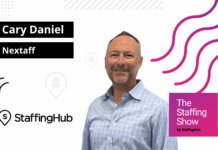
Key takeaways:
- Companies are rapidly adopting talent platforms: 62% of businesses are either using or planning to explore talent platforms within two years, driven by hiring challenges and high turnover costs (averaging $36,723 annually per company).
- Recruiters’ roles are evolving, not disappearing: Rather than being replaced by AI, recruiters are becoming strategic talent advisors who focus on relationship building, career guidance, and talent development instead of repetitive sourcing tasks.
- Success requires combining technology with human engagement: The most effective approach blends platform efficiency for matching and screening with human expertise for building talent communities, providing career support, and delivering strategic value to both clients and candidates.
While many employers want to increase their headcount this year, they’re also preparing for more turnover.
The latest Employment Outlook Survey from ManpowerGroup shows that four in 10 companies plan to boost hiring in Q3, 42% expect employment levels to stay the same, and 16% will decrease staff numbers. Meanwhile, a survey from Express Employment Professionals-Harris Poll found that nearly two in five US hiring managers (39%) expect turnover at their company to increase this year (up from 33% in 2024). And that turnover is expensive — on average, turnover costs businesses $36,723 annually in expenses like rehiring and lost productivity. For one in five hiring managers (20%), that number climbs to $100,000 or more each year.
In this landscape, companies are desperate for better talent solutions, which is leading them toward talent platforms that can deliver speed, scale, and cost-effectiveness. A new Staffing Industry Analysts (SIA) white paper, created in partnership with Randstad Digital and Open Assembly, found that 24% of enterprises already have talent platforms in place, and an additional 38% are likely to explore this option over the next two years. This means 62% of businesses are either using or looking into talent platforms to support their hiring goals — a clear signal that the market is shifting toward technology-enabled solutions.
What does this mean for staffing agencies? In short, it’s a call for tech-driven changes to the traditional recruitment methods that have worked for decades.
It’s about building talent communities
The most successful platforms aren’t just matching engines — they’re talent communities. As Sander van’t Noordende, CEO of Randstad, notes in the SIA white paper, “We have to have the talent before you even know you need it.”
Traditional staffing has been reactive — a client calls with a need, and recruiters scramble to find candidates. The platform model is proactive, maintaining engaged communities of pre-vetted talent ready for immediate deployment.
And talent is increasingly seeking more than just job placement. They want career development, skill building, and ongoing engagement. The majority of temporary workers surveyed by SIA said they would be highly interested in free training opportunities if their staffing firm offered them.
Recruiters aren’t being replaced — they’re becoming more valuable
The fear that technology will eliminate recruiting jobs misses the bigger picture. Yes, AI can match resumes to job descriptions faster than any human. But this doesn’t mean that the role of the recruiter is going away; it’s just evolving. “In the past, recruiters spent countless hours identifying and searching for talent,” said Graig Paglieri, CEO of Randstad Digital, in SIA’s white paper. “Today, that’s being automated — elevating the role of a recruiter to talent advisor and providing a more meaningful role in advancing the career journey for talent.”
This shift represents an upgrade, not a downgrade, for skilled recruiters. Instead of spending time on repetitive sourcing and screening, they become strategic advisors who help talent navigate career decisions and develop skills for emerging opportunities.
Successful staffing agencies will redeploy their human capital from transactional matching to relationship building and talent development. The human skills of a traditional staffing firm will be essential for keeping talent engaged on the platform, helping to curate a thriving, engaged talent community.
Essentially, your recruiters can stop competing with algorithms on speed and start focusing on what humans do best — building relationships, providing guidance, and delivering strategic value.
Combining tech and human touch
For hiring managers, the ideal talent platform offers them direct access to a pool of pre-vetted talent within their desired specialty. They can choose between a completely independent, self-service experience or a guided approach, where they consult with a recruiter to discuss their specific requirements.
This omnichannel approach mirrors what we’ve seen in retail, where companies like Walmart seamlessly blend online and offline experiences. Effectively integrating technology with human expertise creates a unified, superior experience for both clients and talent.
Real-world examples demonstrate the power of this approach. At a midsize property management technology company in San Francisco, executives were spending 25% of their time interviewing engineers and couldn’t find qualified candidates after interviewing roughly 50 applicants over three months. After partnering with a platform-enabled staffing solution, they reduced their interviewing time from 25% to 5% and successfully hired several qualified engineers — three of these became full-time employees.
5 action items for staffing leaders
- Invest in platform capabilities: Whether through building, buying, or partnering, you need talent platform capabilities. The days of purely human-driven processes are numbered. The 40% of employers anticipating an increase in hiring will be looking for the fastest, most efficient solutions.
- Rebuild around talent engagement: Once the platform is integrated, the priority shifts from the client to the talent. Build communities, provide training, and create career pathways that keep talent engaged long-term.
- Specialize and scale: Even when a platform’s role is limited to recruiting, it often makes more sense for the platform to specialize in a certain field, given the different nuances in matching a nurse to a travel assignment, a software developer to a project, etc. Choose your specializations carefully and build deep expertise in those areas.
- Rethink job definitions: Sometimes, a hiring manager just needs certain skills and qualifications, and AI can match talent with those skills and qualifications accordingly. In many cases, trying to force a job description into this matching process muddies the water. Consider skills-based matching and project-based work arrangements.
- Embrace global talent pools: For remote work, the benefits of casting a wide net for talent across various countries can help platforms build the scale they need and present significant wage arbitrage opportunities. But ensure you understand the compliance requirements and cultural nuances in each market.
By combining platform efficiency with deep human engagement, staffing agencies will create value for all stakeholders — clients get faster, more strategic service; talent receives better career support and opportunities; and agencies build more sustainable, profitable businesses.





